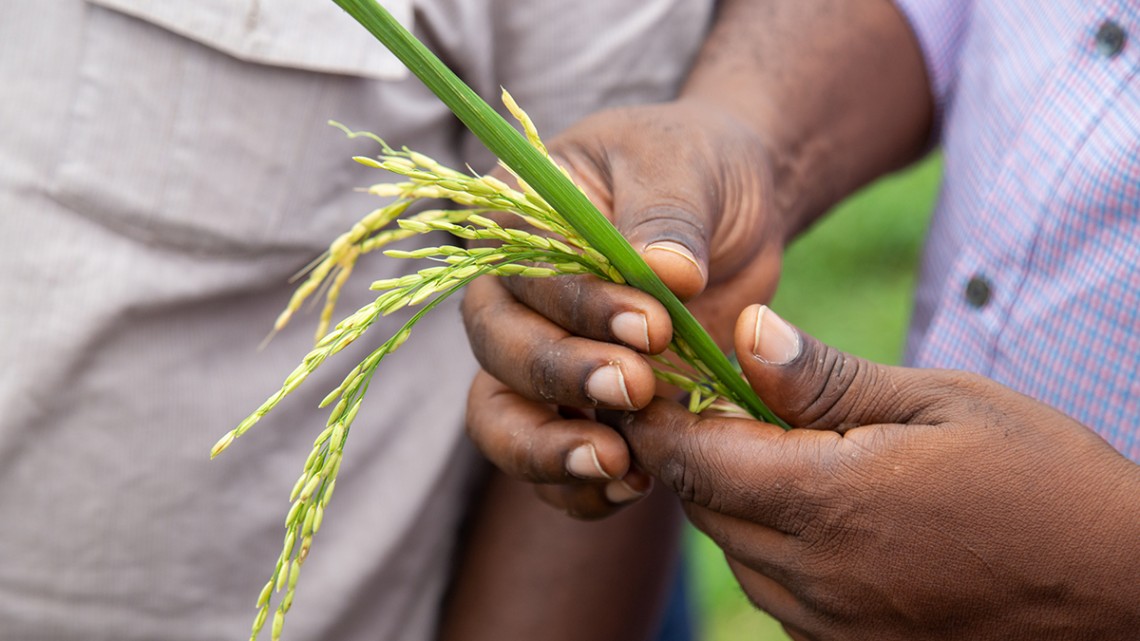
Scientists examine rice in a field in Ghana.
News directly from Cornell's colleges and centers
Fellowship program enhances opportunities in crop improvement for students from underrepresented backgrounds
By Kelly Merchan
A new graduate fellowship program will support students from Minority Serving Institutions (MSIs) to become next-generation leaders in global crop improvement.
Led by the Feed the Future Innovation Lab for Crop Improvement (ILCI) with support from the U.S. Agency for International Development, the Feed the Future Innovation Lab for Crop Improvement Minority Serving Institutions Fellowship Associate Award will fund up to 10 students from MSIs in the United States for advanced technical training at Cornell. The initiative aims to increase opportunities for students from historically underrepresented backgrounds, including those who identify as Black, Hispanic/Latina/o/x, Indigenous, women, non-binary, LBGTQIA2S, and/or living with a disability, to engage in research and capacity development activities in plant breeding and related social science fields from agricultural economics to gender equality and youth inclusion.
The Fellows will take part in research and classes at Cornell in the first year and then, during the following summer, develop an individual research project aimed at making food more accessible, reliable, and responsive to the diverse needs around the globe.
The fellowship is representative of the Innovation Lab’s commitment to diversity, equity, inclusion, and access — not only in its partner countries across Africa, Latin America and the Caribbean, but also throughout the United States — as it will focus on minoritized or historically excluded individuals in STEM fields, according to Levon Esters, ILCI’s MSI partnership advisor and Associate Dean for Diversity, Equity & Inclusion and Faculty Affairs at Purdue University’s Polytechnic Institute.
The program will include a robust and comprehensive mentorship education and training program that will help develop culturally responsive research mentors at participating universities, Esters said.
“This new fellowship will showcase to other Feed the Future Innovation Labs and their international collaborators the importance of engaging with MSIs in partnerships, and how equitable practices lead to mutually beneficial relationships,” said Esters.
“There is an imperative need to shift norms and power dynamics in global crop improvement. We are confident that this fellowship will contribute to ILCI’s overarching goal to build a more equitable system by supporting a more diverse workforce,” said Hale Ann Tufan, associate director of ILCI and research professor in the Department of Global Development at Cornell University.
The project will create synergies among faculty from MSIs and Cornell that will result in increased communication, social capital, collaborative projects, and enhanced training opportunities for students who want to engage in research and capacity-strengthening activities on global crop improvement, according to Stephen Kresovich, director of the ILCI and professor in Cornell University’s School of Integrative Plant Science.
“We’re excited to provide unique training opportunities for STEM graduate students from historically underrepresented backgrounds,” said Kresovich. “Moreover, we see the Innovation Lab as an intellectual and operational bridge between MSIs and our international partners focusing on crop improvement.”
The fellowship will draw on strategic partnerships with the National Alliance for Inclusive and Diverse STEM Faculty (ASPIRE) to strengthen a community of practice and the Center for the Improvement of Mentored Experiences in Research (CIMER) to develop the mentorship program.
“The existing and emerging synergies are exciting to see, and I look forward to opportunities to explore how they can be utilized to broaden our collective capacity and impact at Cornell,” said Sara Xayarath Hernández, associate dean for inclusion and student engagement at Cornell University’s Graduate School.
Based at Cornell University’s Department of Global Development in the College of Agriculture and Life Sciences, the Feed the Future Innovation Lab for Crop Improvement is one of more than 20 Innovation Labs funded by the United States Agency for International Development as part of Feed the Future, the U.S. Government’s global hunger and food security initiative.
ILCI partners with scientists and stakeholders around the globe to co-develop tools, technologies and methods in crop improvement that address local concerns and focus on community impact. ILCI’s goal is to listen to National Agricultural Research Institutes as they define their own goals and drive advancement to breed resilient crop varieties that stand up to pests, diseases and climate change. ILCI’s four Centers of Innovations are based in Costa Rica and Haiti, Malawi, Senegal and Uganda and cover a range of local crops essential to food security.
Kelly Merchán is a communications specialist in the College of Agriculture and Life Sciences’ Department of Global Development.
Media Contact
Get Cornell news delivered right to your inbox.
Subscribe
